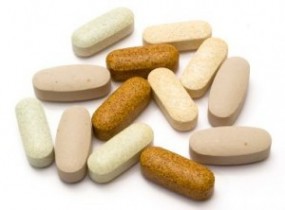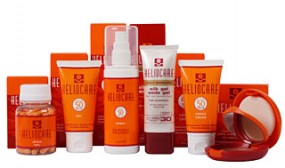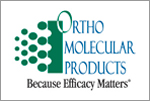- Fitness (19)
- News & Reviews (25)
- Nutrition (20)
- Science (10)
- Supplements (6)
- Technologies (8)
- The Arts (9)
The Multivitamin Maelstrom
November 7th, 2011
 By Cathie Dunal, MD, MPH: The media’s most recent — and unsubstantiated — medical claim comes from the Iowa Health Study in an article in the Annals of Internal Medicine: researchers state that mortality rates increase in older women who take daily multivitamin and mineral supplements. This claim has circled throughout the major media carriers, even landing in the Chicago Tribune, “…older women who took a daily vitamin supplement — even just a multivitamin — had an increased risk of dying of cardiovascular disease and cancer.” Look thoroughly at the research before you throw away your vitamins!
By Cathie Dunal, MD, MPH: The media’s most recent — and unsubstantiated — medical claim comes from the Iowa Health Study in an article in the Annals of Internal Medicine: researchers state that mortality rates increase in older women who take daily multivitamin and mineral supplements. This claim has circled throughout the major media carriers, even landing in the Chicago Tribune, “…older women who took a daily vitamin supplement — even just a multivitamin — had an increased risk of dying of cardiovascular disease and cancer.” Look thoroughly at the research before you throw away your vitamins!
A closer look shows that the Iowa Health Study article is not the rigorous, randomized study that is the gold standard in medical research; instead, it is simply observational. Women (average age: 61.6) self-reported their health status in 1986, 1997 and 2004. Finally, in 2008, after twenty-two years and only three checks, researchers tallied the number of women who had passed away due to cardiovascular disease, cancer or “other causes”.
Clearly the structure of the study wasn’t optimal, and furthermore, the study simply ignored the baseline health levels of the respondents. (Were they all basically healthy? Did any of the respondents have high blood pressure? How high? A family history of heart disease? Were they big fast food eaters?) We can’t accurately determine the respondents’ baseline health levels — and that, in a nutshell, is one of the major reasons the study is flawed.
As well, we have to address the supplements themselves: Were they of a high quality? Were the women taking supplements to cure an existing complaint, or taking them preventively to maintain optimal health levels? The study found that participants who took iron had the greatest mortality rate — and this finding, I argue, raises just these questions.
If we momentarily backtrack to the Seventies — remembering that the average age of the participants was over sixty at the beginning of the study — we’ll remember that media outlets had been saturated with Geritol® commercials promising to fix “iron-poor blood” or “tired blood”. Iron was marketed as a cure for tiredness, and Geritol® was the largest selling iron and B vitamin supplement in the US until 1979. I suspect that a significant number of the respondents who took iron were self-medicating tiredness — or other symptoms that could very well have been caused by underlying medical conditions. As the study fails to provide contextual information regarding the rationale behind supplement-taking, it becomes almost impossible to accurately analyze the study’s claims.
And finally, the findings in the Iowa Health Study are contradicted by a wealth of other research. Literally the next day after the Iowa Health Study was published, a summary article appeared in the Harvard Health Newsletter reporting better health with folic acid supplements and Vitamins B6 and B12. Quite contradictory.
The bottom line: this is a flawed study that has been overblown by the media. It will be interesting to see more research on the topic, as it is clearly a hot-button issue in the medical community. Meanwhile, I’m still taking my vitamins!
Wintertime Vitamin D
October 11th, 2011
 By John Fauber of the Journal Sentinel: If the current strain of H1N1 swine flu is like flu strains of years past, it likely will mysteriously subside in the coming weeks.
By John Fauber of the Journal Sentinel: If the current strain of H1N1 swine flu is like flu strains of years past, it likely will mysteriously subside in the coming weeks.
For whatever reason, in temperate areas such as North America, flu largely is a fall and winter phenomenon. A couple of theories have tried to explain that seasonality, but in recent years an intriguing new idea has emerged:
Levels of flu-fighting vitamin D reach their lowest point in the winter when ultraviolet light disappears.
Vitamin D, which is made in large amounts in the skin when it is exposed to solar radiation, is a hormone that regulates hundreds of genes. Some of those involve the body’s innate immunity and its defenses against viruses, especially those affecting the respiratory system.
The idea is that if people increased their levels of vitamin D, it might help ward off outbreaks of flu.
For as far back as records exist, flu outbreaks have occurred around the planet when solar radiation was at its lowest. No one has been able to say why.
“It virtually disappears in the summer in temperate climates,” said William Schaffner, chairman of the department of preventive medicine at Vanderbilt University School of Medicine. “In the tropics it kind of smolders all year long. Its seasonality is not nearly as pronounced.”
Filed under Supplements | Comments Off on Wintertime Vitamin DZinc Edges Out Chicken Soup
February 15th, 2011
.jpg) From The New York Times by Tara Parker-Pope: Scientists still haven’t discovered a cure for the common cold, but researchers now say zinc may be the next best thing.
From The New York Times by Tara Parker-Pope: Scientists still haven’t discovered a cure for the common cold, but researchers now say zinc may be the next best thing.
A sweeping new review of the medical research on zinc shows that sniffing, sneezing, coughing and stuffy-headed cold sufferers finally have a better option than just tissue and chicken soup. When taken within 24 hours of the first runny nose or sore throat, zinc lozenges, tablets or syrups can cut colds short by an average of a day or more and sharply reduce the severity of symptoms, according to the Cochrane Database of Systematic Reviews, a respected medical clearinghouse.
In some of the cited studies, the benefits of zinc were significant. A March 2008 report in The Journal of Infectious Diseases, for example, found that zinc lozenges cut the duration of colds to four days from seven days, and reduced coughing to two days from five.
While it’s not certain how the mineral curbs colds, it appears to have antiviral properties that prevent the cold virus from replicating or attaching to nasal membranes.
Filed under Supplements | Comments Off on Zinc Edges Out Chicken SoupHeliocare
August 21st, 2010
 Heliocare is a groundbreaking capsule for sun protection made from the fern Polypodium leucotomos. It offers a degree of additional whole body sun protection and prevents DNA damage. You still need your sunscreen! But it may be worthwhile if you have fair skin, sun damage, lots of sun exposure, or a personal or family history of skin cancers.
Heliocare is a groundbreaking capsule for sun protection made from the fern Polypodium leucotomos. It offers a degree of additional whole body sun protection and prevents DNA damage. You still need your sunscreen! But it may be worthwhile if you have fair skin, sun damage, lots of sun exposure, or a personal or family history of skin cancers.
Technically, Heliocare is dietary supplement with antioxidant properties which help maintain the skin’s ability to protect against sun-related effects and aging. It was discovered while scientists were looking for a treatment for vitiligo.
Fernblock™, the principal performance ingredient, works to protect skin structure, modulate immune response, and provide a daily defense against the UV photoaging process. Heliocare acts as a scavenger to mop up free radicals and reactive oxygen species (ROS), particularly superoxide anions. It helps to repair damaged DNA in the skin. (I’m taking it on a daily basis, year-round.)
You can find scientific info on Polypodium leucotomos at ncbi.nlm.nih.gov/pubmed/15583582 and webmd.com
We import Heliocare from New Zealand, and it’s available in our office.
Filed under Supplements | Comments Off on HeliocareMetagenics Supplements
August 21st, 2010
 “The term ‘functional medicine’ was coined in 1993 to describe the medicine of the future. Today, many integrative and complementary and medicine practitioners use a functional medicine approach. By promoting changes in lifestyle, environment, and nutrition, these practitioners rely on their knowledge of key physiological, genetic, and biochemical processes for establishing an innovative form of total patient wellness.
“The term ‘functional medicine’ was coined in 1993 to describe the medicine of the future. Today, many integrative and complementary and medicine practitioners use a functional medicine approach. By promoting changes in lifestyle, environment, and nutrition, these practitioners rely on their knowledge of key physiological, genetic, and biochemical processes for establishing an innovative form of total patient wellness.
1. Patient uniqueness: Each individual is unique. This uniqueness encompasses voluntary activities, such as decision-making, personality development, and emotional response, and involuntary activities like metabolism of nutrients, cellular processing of information, and communication among the body’s organ systems. Functional medicine professionals realize that all individuals have unique metabolic patterns that affect their health needs and thus, the concept of individuality is central to every aspect of functional medicine, from clinical assessment and diagnosis to the broad spectrum of treatment modalities.
Filed under Supplements | Comments Off on Metagenics Supplements



